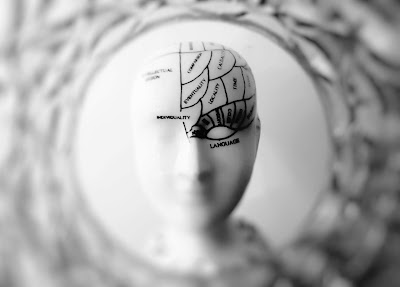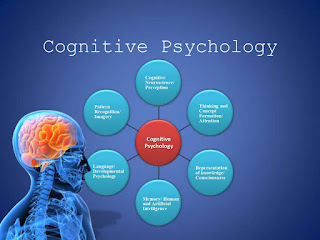To better understand the specific methods used by cognitive psychologists, one must grasp the goals of research in cognitive psychology. Briefly, those goals include data gathering, data analysis, theory development, hypothesis formulation, hypothesis testing, and perhaps even application to settings outside the research environment. However, most cognitive psychologists want to understand more than cognition. They also seek to understand the HOW and the WHY of thinking.
That is, researchers seek ways to explain cognition as well as describe it. To move beyond descriptions, cognitive psychologists must leap from what is observed directly to what can be inferred regarding observations.
DISTINCTIVE RESEARCH METHODS:-
Cognitive psychologists use various methods to explore how humans think. These methods include
(i) laboratory or other controlled experiments,
(ii) psychobiological research,
(iii) self-reports, case studies, naturalistic observation, and
(iv) computer simulations and artificial intelligence.
Each method offers distinctive advantages and disadvantages.
i) Experiments on Human Behaviour: In controlled experimental designs, an experimenter conducts research, typically in a laboratory setting. The experimenter controls as many aspects of the experimental situation as possible. There are basically two kinds of variables in any given experiment – independent variables and dependent variables. The irrelevant variables are held constant and are called control variables. In implementing experimental method, the experimenter must use a representative and
random sample of the population of interest. S/he must also exert rigorous control over the experimental conditions. If those requisites for the experimental method are fulfilled, the experimenter may be able to infer probable causality. This influence is of the effects of the independent variable (the treatment) on the dependent variable (the outcome) for the given population.
ii) Psychobiological Research: Through psychobiological research, investigators study the relationship between cognitive performance and cerebral events and situations. The various specific techniques used in the psychobiological research generally fall into three categories.
- The first category is that of techniques for studying an individual’s brain post-mortem, relating the individual’s cognitive function prior to death to observable features of the brain.
- The second category is techniques for studying images showing structures of or activities in the brain of an individual who is known to have a particular cognitive deficit.
- The third is techniques for obtaining information about cerebral processes during the normal performance of a cognitive activity (e.g. by using brain imaging techniques).
iii) Self-Reports, Case Studies, and Naturalistic Observation: Individual experiments and psychobiological studies often focus on precise specification of discrete aspects of cognition across individuals. To obtain richly textured information about how particular individuals think in a broad range of contexts, researchers may use self-reports (an individual’s own account of cognitive processes), case studies (in-depth studies of individuals), and naturalistic observation (detailed studies of cognitive performance in everyday situations and no laboratory contexts). On the one hand, experimental research is most useful for testing hypotheses. On the other hand, research based on qualitative methods is often particularly useful for the formulation of hypotheses. These methods are also useful to generate descriptions of rare events or processes that we have no other way to measure.
iv) Computer Simulations and Artificial Intelligence: Digital computers played a fundamental role in the emergence of the study of cognitive psychology. One kind of influence is indirect though models of human cognition based on models of how computers process information. Another kind is direct, that is through computer simulations and artificial intelligence.
In computer simulations, researchers program computers to imitate a given human function or process. Some researchers even have attempted to create computer models of the entire cognitive architecture of the human mind. Their models have stimulated heated discussions regarding how the human mind may function as a whole. Sometimes the distinction between simulation and artificial intelligence is blurred. It is also possible to combine the two approaches.
Cognitive psychologists often broaden and deepen their understanding of cognition through research in cognitive science. Cognitive science is a cross-disciplinary field that uses ideas and methods from cognitive psychology, psychobiology, artificial intelligence, philosophy, linguistics, and anthropology.
Cognitive psychologists use these ideas and methods to focus on the study of how humans acquire and use knowledge. They also work in collaboration with other psychologists, such as social psychologists (in the field of social cognition), psychologists who study motivation and emotion, and engineering psychologists (who study human-machine interactions).
DOMAINS OF COGNITIVE PSYCHOLOGY:-
Modern cognitive psychology freely, draws theories and techniques; from twelve principal areas of research. Each area, in brief, is described below:
i) Cognitive Neuroscience:
Only within the past few years have cognitive psychologists and cognitive neuroscientists formed a close working relationship. Thus far, this union has produced some of the most provocative developments in the study of our mental character. Cognitive psychologists
are seeking neurological explanations for their findings, and neuroscientists are turning to cognitive psychologists to explain observations made in their laboratories. Every part of the cognitive process from sensation to memory is supported by basic electrochemical processes taking place in the brain and nervous system.
Fig. 1.1: Principal research areas of cognitive psychology
ii) Perception:
The branch of psychology directly involved with the detection and interpretation of sensory stimuli is perception. From experiments in perception, we have a good understanding of the sensitivity of the human organism to sensory signals and more important to cognitive psychology of the way we interpret sensory signals. The experimental study of perception has helped identify many of the parts of this process. However, the study of perception alone does not adequately account for the expected performance; other cognitive systems are involved, including pattern recognition, attention, consciousness, and memory.
iii) Pattern Recognition:
Environmental stimuli rarely are perceived as single sensory events; they usually are perceived as part of a more meaningful pattern. The things we sense – see, hear, feel, taste, or smell—are almost always part of a complex pattern of sensory stimuli. Think about the problem of reading. Reading is a complex effort in which the reader is required to form a meaningful pattern from an otherwise meaningless array of lines and curves. By organizing the stimuli that make up letters and words, the reader may then access meaning from his or her memory. The entire process takes place in a fraction of a second, and considering all the neuroanatomical and cognitive systems involved, this feat – performed daily by all sorts of people – is wondrous.
iv) Attention:
Although we are information-gathering creatures, it is evident that under normal circumstances we are also highly selective in the amount and type of information to which we attend. Our capacity to process information seems to be limited to two levels – sensory and cognitive. If too many sensory clues are imposed upon us at any given time, we can become overloaded; if we try to process too many events in memory, we can become overloaded, which may cause a breakdown in performance. All of us have felt the same way at one time or another.
v) Consciousness:
Consciousness is defined as “the current awareness, of external or internal circumstances.” Rejected as being “unscientific” by the behaviourists, the word consciousness and the concept it represents simply did not fade away. For most people, consciousness and unconscious thoughts (such as you might have on a first date) are very real. For example, when you glance at your watch while studying and it reads “10:42 (P.M.),” you are conscious or aware of that external signal. However, your reading of the time also brings up another conscious thought, one that was initially activated by reading the time but is from “inside.” That conscious thought might be, “It’s getting late: I’d better finish this chapter and go to bed”. Consciousness has gained new respectability recently and now is a concept studied seriously in modern cognitive psychology.
vi) Memory:
Memory and perception work together. The information available to us comes from our perception, short-term memory and long-term memory. Most obvious long-term storage is the knowledge of the language. We draw words from LTM and more or less use them correctly. In a fleeting second, we are able to recall information about an event of years before. Such information does not come from an immediate perceptual experience; it is stored along with a vast number of other facts in the LTM.
vii) Representation of Knowledge:
Fundamental of all human cognition is the representation of knowledge: how information is symbolised and combined with the things stored in the brain. This part of cognition has two aspects:the conceptual representation of knowledge in mind and the way the brain stores and process information. The conceptual representation in different individuals can be considerably different. In spite of these inherent dissimilarities between representations of knowledge, most humans do experience and depict experience in similar enough ways to get along well in the world. The content of this information is also hugely different. But our neurological web entraps information and experiences and holds them in structures that are similar in all human brains.
viii) Imagery:
Cognitive psychologists are especially interested in the topic of Cognitive Psychology internal representations of knowledge. The mental images of the environment are formed in the form of a cognitive map, a type of internal representation of the juxtaposed buildings, streets, street signs, spotlights and so on. From the cognitive maps, we are able to draw out significant cues. Although the experimental study of mental imagery is relatively new to psychology, some significant research has recently been reported.
ix) Language:
One form of knowledge shared by all human societies is the knowledge of language. Language is the principal means by which we acquire and express knowledge; thus, the study of how language is used is a central concern of cognitive psychology. Human language development represents a unique kind of abstraction, which is basic to cognition. Language processing is an important component of information processing and storage. Language also influences perception, a fundamental aspect of cognition.
x) Developmental Psychology:
Developmental psychology is another important area of cognitive psychology that has been intensely studied. Recent studies and theories in developmental cognitive psychology have greatly expanded our understanding of how cognitive structures develop. As adults, we have all lived through childhood and adolescence and we share maturational experiences with all members of our species.
xi) Thinking and Concept Formation:
Thinking is the crown jewel of cognition. Thinking is the process by which a new mental representation is formed through the transformation of information. Advances in cognitive psychology have led to a formidable arsenal of research techniques and theoretical models. An ability to think and form concepts is an important aspect of cognition. Similar concepts help in the understanding and processing of information. There is a considerable body of knowledge about the laws and processes of concept formation.
xii) Human and Artificial Intelligence:
Human intelligence includes the ability to acquire, recall and use knowledge to understand concrete and abstract concepts and the relationships among objects and ideas to understand a language, to follow instructions, to convert verbal descriptions into actions and to behave according to the rules and to use knowledge in a meaningful way.
The specialty within the computer science called artificial intelligence has had a major influence on the development of cognitive science, especially since the design of programs requires knowledge of how we process information. Cognitive psychology also addresses to find out whether a perfect robot can simulate human behaviour


Comments
Post a Comment
If you have any doubts,Please let me know.